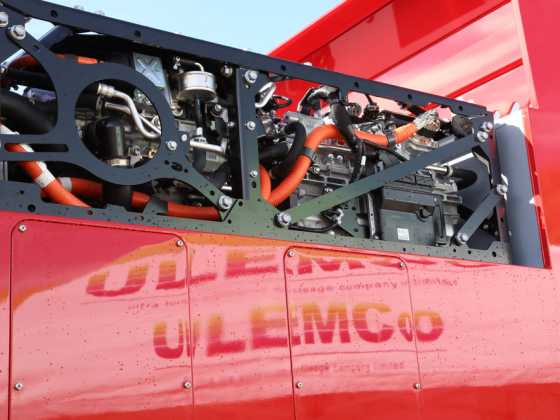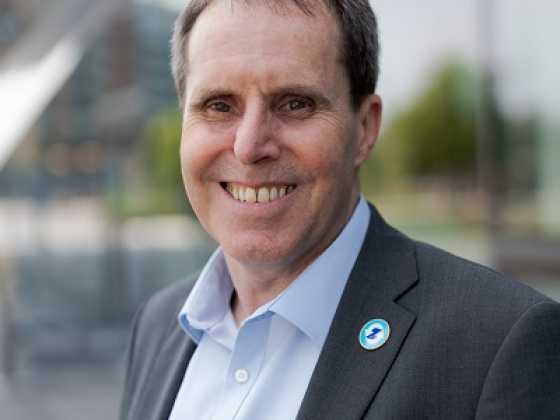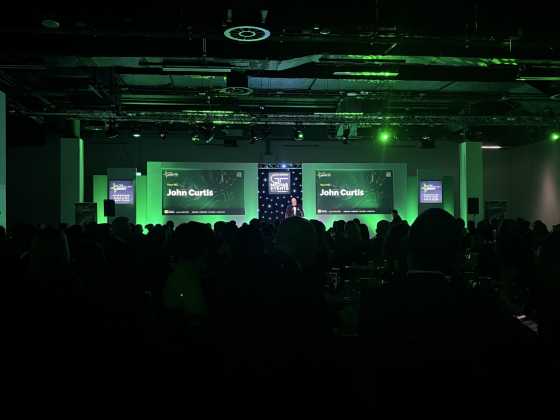A real-life demonstration of zero emission HGVs

The ZENFreight project will demonstrate both hydrogen fuel cell and battery electric HGVs in real world operation to demonstrate their operational feasibility and cost-effectiveness compared to their diesel counterparts. Following a recent project reset, we get an update on how the work is progressing
The ZENFreight consortium, a key player in the UK Government’s Zero Emission HGV and
Infrastructure Demonstrator (ZEHID) Programme, has pressed reset on its ambitious plans to revolutionise heavy goods vehicle (HGV) transport.
Of the four ZEHID consort, only ZENFreight will demonstrate both hydrogen fuel cell (HFCEVs)
and battery electric vehicles (BEVs) in real world operation. It is this unique positioning that sees
the project return with renewed clarity, a sharper focus, and the backing of an industry determined to make zero emission road freight a reality.
Funded by the Department for Transport and delivered in partnership with Innovate UK, ZENFreight’s revised approach will see the deployment of 65 zero-emission trucks – 62 BEVs and three HFCEVs – across fleets operated by some of the UK’s biggest logistics names, including Eddie Stobart, DFDS, Great Bear, Gregory Distribution, and Maritime Transport.
A fresh start with clear purpose
At the helm of this project reset is Dynamon, a fleet optimisation software specialist, which
has stepped up as the lead partner. The consortium remains as robust as ever, bringing
together academic expertise from Imperial College London, leading manufacturers DAF Trucks, Daimler Trucks, Scania, and Volvo Trucks, and a £63 million investment package,
including £43 million in government funding.
The vehicles will enter real world service by March 2026 and operate for five years, generating valuable data to demonstrate the operational feasibility and cost-effectiveness of zero-emission HGVs compared to their diesel counterparts. The goal is to create a
compelling business case for the industry-wide adoption of zero-emission technologies.
Dr Angus Webb, founder and CEO of Dynamon, expressed the determination behind the reset: “We have a strong vision to use data-driven planning to maximise the utilisation of vehicles and infrastructure, and the support of committed partners. ZENFreight is now
accelerating with purpose, ready to tackle the challenges ahead and pave the way for cost-
effective sustainable freight operations.”
The consortium has already made impressive strides despite tighter timeframes, and the fleet operators have stepped up to take ownership and drive progress across the board.
"Progress on the BEV front is well underway, with vehicle orders in place and infrastructure development progressing," said Angus. "With 60 per cent of sites having validated offers in place, charge point operators are moving quickly."
Tackling the infrastructure challenge
Infrastructure continues to be a significant hurdle across all zero emission HGVs, with the design, planning, and deployment of green hydrogen refuelling stations posing some of the most complex challenges.
The ZENFreight project will establish a nationwide network of shared EV charing locations at 25 depots. By utilising shared depot infrastructure during the demonstration phase, the consortium aims to demonstrate a practical and cost-effective model for fleet operators to follow.
Dr Webb also views Battery Energy Storage Systems (BESS) as a valuable interim solution to get fleets operational with electric HGVs. "BESS can provide an effective way to deliver fast-charging capabilities at grid-constrained sites," Webb explained. "As truck electrification progresses, deploying energy storage systems, alongside appropriately sized grid upgrades, will be one of the most cost-effective and agile ways to ensure fleets have the charging infrastructure they need to start introducing eHGVS now."
Data-driven development
ZENFreight’s strategy is underpinned by advanced fleet optimisation software from Dynamon. Using its proprietary ZERO platform,the consortium will analyse fleet data, simulate vehicle performance, and identify cost-effective decarbonisation opportunities across specific routes and operations.
Initial trials will focus on simpler routes to build confidence in vehicle performance and operational capabilities. Insights gained will then inform more complex scenarios, including top-up charging using shared fleet depot infrastructure. For Dr Webb, the top up charging simulation is a gamechanger. “ZERO’s powerful new Top-Up Charging’ Feature helps EV fleets plan routes with precise charging needs. It shows where a truck should top up and how long for to complete its delivery schedule, giving fleet operators the insights and confidence to optimise routes with the essential charging stops available now."
Dr Isabella Panovic, programme manager for zero emission freight at Innovate UK, also sees data as a cornerstone of the project’s impact. “Through clever use of simulation to optimise deployments, this project will help to create the evidence base to decarbonise the UK’s heaviest road freight vehicles. This will help the sector grow in confidence and invest long term in zero emission HGVs.”
By leveraging data and simulation, ZENFreight isn’t just testing vehicles – it’s stress-testing the entire system, from vehicles to infrastructure, to ensure that real-world deployments align with fleet needs.
Collaboration: they key to success
ZENFreight is a shining example of collaboration in action. Bringing together operators, manufacturers, academics, and policymakers, the project has pooled resources and expertise to tackle the decarbonisation challenge head-on.
Large scale national fleet operators bring the operational insight needed to validate zero-emission technologies, while the vehicle manufacturers, and charging infrastructure developers provide the hardware to make it happen. The inclusion of academic partner Imperial College London ensures the findings are robust and can shape future policy and innovation.
Momentum building for a sustainable future
The five-year demonstration phase is about more than just putting trucks on the road. It's about building momentum overcoming challenges, and inspiring confidence in a sector that has long relied on diesel to keep the economy moving.
ZENFreight's work aligns with broader UK climate goals, helping to decarbonise one of the most challenging sectors. The project's findings will shape the future of HGV operations, addressing not just technical and operational questions but also the economic case for change.
Dr Webb captures the vision behind ZENFreight's mission: "The industry's shared commitment to reshaping freight transport is clear. By working together, we're not just addressing today's challenges -- we're laying the foundation for tomorrow's solutions."
For fleet operators, manufacturers and policymakers alike, ZENFreight's reset marks the beginning of a bold journey - one where collaboration, innovation, and forward-thinking will be key to driving real change.






